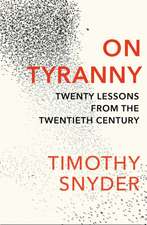Competitive Authoritarianism: Hybrid Regimes after the Cold War: Problems of International Politics
Autor Steven Levitsky, Lucan A. Wayen Limba Engleză Paperback – 15 aug 2010
| Toate formatele și edițiile | Preț | Express |
|---|---|---|
| Paperback (1) | 238.60 lei 22-36 zile | |
| Cambridge University Press – 15 aug 2010 | 238.60 lei 22-36 zile | |
| Hardback (1) | 710.21 lei 43-57 zile | |
| Cambridge University Press – 15 aug 2010 | 710.21 lei 43-57 zile |
Din seria Problems of International Politics
-
 Preț: 200.13 lei
Preț: 200.13 lei -
 Preț: 227.61 lei
Preț: 227.61 lei -
 Preț: 224.24 lei
Preț: 224.24 lei -
 Preț: 159.18 lei
Preț: 159.18 lei -
 Preț: 251.27 lei
Preț: 251.27 lei -
 Preț: 205.41 lei
Preț: 205.41 lei -
 Preț: 252.21 lei
Preț: 252.21 lei -
 Preț: 247.41 lei
Preț: 247.41 lei -
 Preț: 229.56 lei
Preț: 229.56 lei -
 Preț: 197.90 lei
Preț: 197.90 lei -
 Preț: 332.68 lei
Preț: 332.68 lei -
 Preț: 319.99 lei
Preț: 319.99 lei -
 Preț: 283.41 lei
Preț: 283.41 lei -
 Preț: 282.48 lei
Preț: 282.48 lei -
 Preț: 226.17 lei
Preț: 226.17 lei - 11%
 Preț: 697.28 lei
Preț: 697.28 lei
Preț: 238.60 lei
Nou
Puncte Express: 358
Preț estimativ în valută:
45.67€ • 49.63$ • 38.39£
45.67€ • 49.63$ • 38.39£
Carte disponibilă
Livrare economică 31 martie-14 aprilie
Preluare comenzi: 021 569.72.76
Specificații
ISBN-13: 9780521709156
ISBN-10: 0521709156
Pagini: 536
Ilustrații: 2 b/w illus. 20 tables
Dimensiuni: 155 x 234 x 36 mm
Greutate: 0.75 kg
Editura: Cambridge University Press
Colecția Cambridge University Press
Seria Problems of International Politics
Locul publicării:New York, United States
ISBN-10: 0521709156
Pagini: 536
Ilustrații: 2 b/w illus. 20 tables
Dimensiuni: 155 x 234 x 36 mm
Greutate: 0.75 kg
Editura: Cambridge University Press
Colecția Cambridge University Press
Seria Problems of International Politics
Locul publicării:New York, United States
Cuprins
Part I. Introduction and Theory: 1. Introduction; 2. Explaining competitive authoritarian regime trajectories: international linkage and the organizational power of incumbents; Part II. High Linkage and Democratization: Eastern Europe and the Americas: 3. Linkage, leverage, and democratization in Eastern Europe; 4. Linkage, leverage, and democratization in Latin America and the Caribbean; Part III. The Dynamics of Competitive Authoritarianism in Low Linkage Regions: The Former Soviet Union, Africa, and Asia: 5. The evolution of post-Soviet competitive authoritarianism; 6. Africa: transitions without democratization; 7. Diverging outcomes in Asia; 8. Conclusion; Appendix. Measuring competitive authoritarianism and authoritarian stability.
Recenzii
'This landmark contribution to the comparative study of political regimes will be widely read and cited. In an epic act of theoretical synthesis, Levitsky and Way weave careful empirical research on three-dozen countries across five world regions into a convincing account of patterns of regime change. In distinguishing democratic transitions from a range of authoritarian outcomes, they reach nuanced conclusions about the relative explanatory influence of international factors (linkage and leverage) and domestic power politics (rulers versus oppositions). Above all, they help us understand how autocrats learn to live with elections. Strongly recommended.' Michael Bratton, University Distinguished Professor of Political Science and African Studies, Michigan State University
'This is a brilliant and truly pathbreaking book that should be closely studied by any serious student of democracy or comparative politics. Its precise conceptualization, striking theory, rigorous comparative methodology, and breathtaking range of case study evidence distinguish it as the most important study of political regimes and regime transitions in a generation.' Larry Diamond, Stanford University
'Competitive Authoritarianism establishes Steven Levitsky and Lucan Way as the Juan Linz and Alfred Stepan of their generation. In the tradition of Linz and Stepan, Levitsky and Way offer an abundance of theoretical and conceptual innovation as well as a trove of empirical material drawn from broad swaths of the globe. The book is as elegantly written as it is theoretically creative. It is written by and for professional social scientists, yet undergraduates and the attentive public will be able to digest the book's central argument and findings with ease. This is what social science should look like.' M. Steven Fish, University of California, Berkeley
'This is the most anticipated book in comparative politics in more than a decade. Written in a single authorial voice, Levitsky and Way's arguments about the distinct trajectories of competitive authoritarian regimes are theoretically grounded, conceptually nuanced, geographically wide ranging, and empirically well supported. I expect this book to have a major impact on the field for many years to come.' Marc Morjé Howard, Georgetown University
'Levitsky and Way's book makes two major contributions to research on political regime change. First, by developing the notion of competitive authoritarianism, it engages in a sustained effort to provide a clear and theoretically fertile conception of a particular subset of political regimes belonging to the vague class of 'hybrid' regimes. Second, it offers the as yet most sophisticated and subtle effort to interweave domestic and international explanations of political regime change with provocative implications for run-of-the-mill theories, whether based on economic development, inequality, or institutions.' Herbert Kitschelt, Duke University
'Regimes that blend meaningful elections and illicit incumbent advantage are not merely resting points on the road to democracy; Levitsky and Way guide us along the multiple paths these regimes can take and provide powerful reasoning to explain why nations follow these distinct paths. This deeply insightful analysis of an important subset of post-Cold War regimes is conceptually innovative and precise, empirically ambitious, and theoretical agile, moving fluidly between international and domestic causes of regime dynamics. Read it to understand the dynamics of contemporary hybrid regimes; then read it again to appreciate its many lessons for our general understanding of regime change.' David Waldner, University of Virginia
'[Levitsky and Way] have made a rich contribution to [a] growing body of literature. Among the many merits of their book is [their] effort to bring greater clarity to the concept they investigate.' Ergun Özbudun, Turkish Review
'This is a brilliant and truly pathbreaking book that should be closely studied by any serious student of democracy or comparative politics. Its precise conceptualization, striking theory, rigorous comparative methodology, and breathtaking range of case study evidence distinguish it as the most important study of political regimes and regime transitions in a generation.' Larry Diamond, Stanford University
'Competitive Authoritarianism establishes Steven Levitsky and Lucan Way as the Juan Linz and Alfred Stepan of their generation. In the tradition of Linz and Stepan, Levitsky and Way offer an abundance of theoretical and conceptual innovation as well as a trove of empirical material drawn from broad swaths of the globe. The book is as elegantly written as it is theoretically creative. It is written by and for professional social scientists, yet undergraduates and the attentive public will be able to digest the book's central argument and findings with ease. This is what social science should look like.' M. Steven Fish, University of California, Berkeley
'This is the most anticipated book in comparative politics in more than a decade. Written in a single authorial voice, Levitsky and Way's arguments about the distinct trajectories of competitive authoritarian regimes are theoretically grounded, conceptually nuanced, geographically wide ranging, and empirically well supported. I expect this book to have a major impact on the field for many years to come.' Marc Morjé Howard, Georgetown University
'Levitsky and Way's book makes two major contributions to research on political regime change. First, by developing the notion of competitive authoritarianism, it engages in a sustained effort to provide a clear and theoretically fertile conception of a particular subset of political regimes belonging to the vague class of 'hybrid' regimes. Second, it offers the as yet most sophisticated and subtle effort to interweave domestic and international explanations of political regime change with provocative implications for run-of-the-mill theories, whether based on economic development, inequality, or institutions.' Herbert Kitschelt, Duke University
'Regimes that blend meaningful elections and illicit incumbent advantage are not merely resting points on the road to democracy; Levitsky and Way guide us along the multiple paths these regimes can take and provide powerful reasoning to explain why nations follow these distinct paths. This deeply insightful analysis of an important subset of post-Cold War regimes is conceptually innovative and precise, empirically ambitious, and theoretical agile, moving fluidly between international and domestic causes of regime dynamics. Read it to understand the dynamics of contemporary hybrid regimes; then read it again to appreciate its many lessons for our general understanding of regime change.' David Waldner, University of Virginia
'[Levitsky and Way] have made a rich contribution to [a] growing body of literature. Among the many merits of their book is [their] effort to bring greater clarity to the concept they investigate.' Ergun Özbudun, Turkish Review
Notă biografică
Descriere
This book explores the fate of competitive authoritarian regimes in the post-Cold War era.









